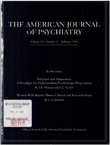Biological and psychosocial predictors of job performance following a first episode of psychosis
Abstract
OBJECTIVE: The purposes of this study were 1) to evaluate occupational functioning 18 months after a first episode of psychosis and 2) to determine predictors of differential outcome. METHOD: Using a variety of sociodemographic, clinical, and psychophysiological measures, the project team assessed adults experiencing a first episode of schizophrenia (N = 33) or affective psychosis (N = 31). Identical measures were obtained from a comparison group (N = 46) who had no history of psychiatric disorder. Work performance was rated at entry into the study and 18 months later. RESULTS: At entry into the study, the schizophrenic subjects displayed the worst job performance, the asymptomatic individuals the best. The subjects with affective psychosis fell in between. Each of the two diagnostic groups evidenced postmorbid occupational decline. Three factors predicted good outcome in the schizophrenic group--good premorbid job performance, female gender, and scores on putative markers of biological vulnerability for the illness. For the affective disorder group, positive labeling by a significant other proved the only predictor of good outcome. CONCLUSIONS: These findings suggest that post-morbid occupational decline is common to both schizophrenia and affective psychosis. Past accomplishment and biological vulnerability predicted short-term course for these schizophrenic patients; psychosocial factors played a more prominent role in affective psychosis.
Access content
To read the fulltext, please use one of the options below to sign in or purchase access.- Personal login
- Institutional Login
- Sign in via OpenAthens
- Register for access
-
Please login/register if you wish to pair your device and check access availability.
Not a subscriber?
PsychiatryOnline subscription options offer access to the DSM-5 library, books, journals, CME, and patient resources. This all-in-one virtual library provides psychiatrists and mental health professionals with key resources for diagnosis, treatment, research, and professional development.
Need more help? PsychiatryOnline Customer Service may be reached by emailing [email protected] or by calling 800-368-5777 (in the U.S.) or 703-907-7322 (outside the U.S.).



